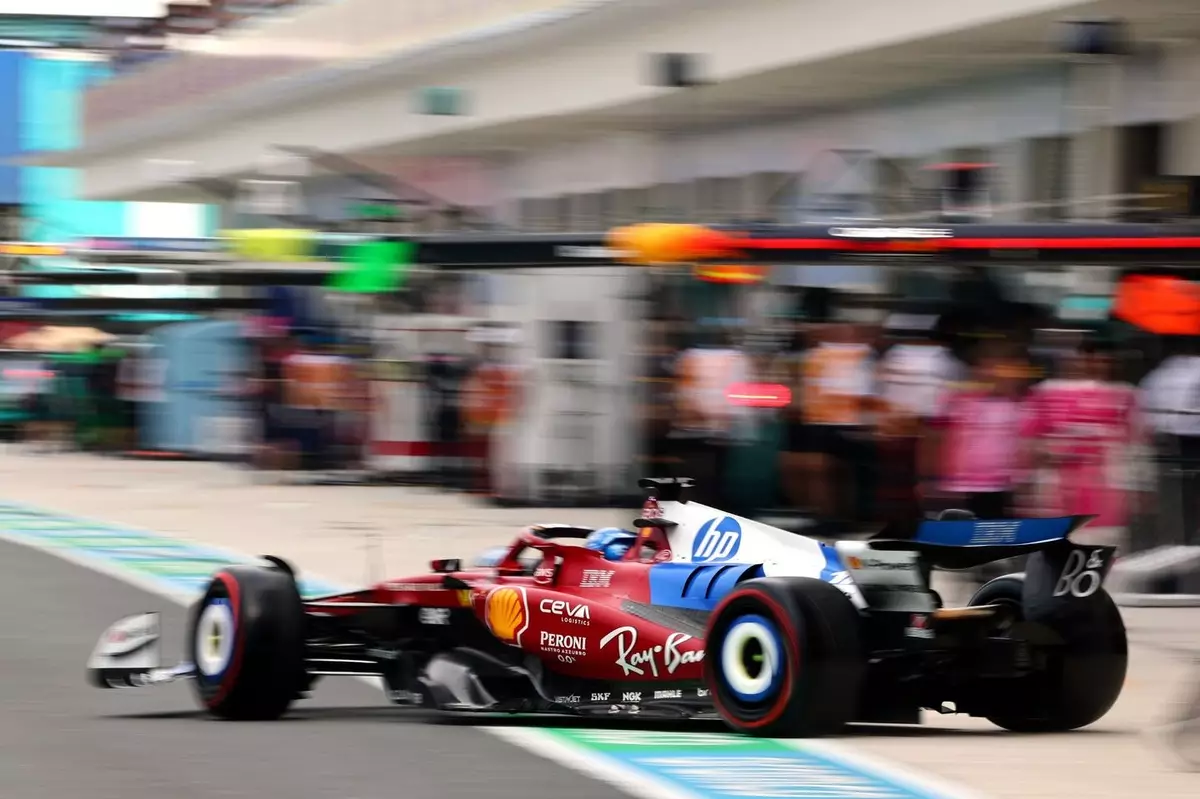In the high-octane world of Formula 1, expectations often clash dramatically with reality, a theme vividly echoed in Charles Leclerc’s experience at the 2025 Miami Grand Prix. While Leclerc expressed confidence in Ferrari’s ability to maximize their car’s potential, the sobering truth emerged as he found himself languishing in eighth place on the grid. This performance was particularly disheartening given that he felt he had executed a solid qualifying lap, which speaks volumes about the disquieting state of the Ferrari team as they face other formidable competitors like McLaren and Red Bull.
Leclerc’s assertion that they have tapped into the car’s maximum performance exposes the haunting imperfection of Ferrari’s machinery. It transcends mere speed; it is about embracing an ethos of consistent competitiveness—a mantra that appears increasingly elusive for the Scuderia. With Leclerc struggling to make headway against the Williams cars, which have historically lagged behind the leading teams, the onus falls heavily on Ferrari’s engineering prowess and strategic decision-making.
The Weight of Expectations and Missteps
Leclerc’s woes were compounded further by a pre-race incident involving aquaplaning during warm-up laps, prompting the driver to miss the sprint race. His candid reflection on the team’s handling of this situation reveals a significant, underlying problem in decision-making during critical moments. Admitting that it was a mistake to venture out on intermediates in treacherous weather conditions identifies a breach in the execution of pre-race strategy—an area where Ferrari has repeatedly stumbled.
The implications of these mistakes are not trivial. Not only did they set back Leclerc and his team, but they also cast a shadow over the mechanics, who faced a more laborious day by having to grapple with the consequences of these errors. Leclerc’s observation that he doesn’t feel he “paid the price” during qualifying reveals a deeper issue—a longing for pace that remains unfulfilled despite the driver’s apparent readiness and skill.
The Track Layout: A Merciless Judge
The Miami International Autodrome’s 5.41-kilometer layout serves as a merciless judge for performance, with its many low-speed corners exposing Ferrari’s limitations. In contrast to the high-speed circuits where Leclerc previously secured strong results, Miami magnifies the pronounced weaknesses in downforce that the team faces. Here, the disparities between Ferrari and its competitors become glaringly obvious—a bitter pill for a team with such a storied legacy in the sport.
Comparing Leclerc’s struggles on this circuit to his podium finish in Jeddah underscores the variability such tracks present in terms of vehicle performance. While Ferrari might shine on high-speed layouts, it is a stark reminder of how crucial fundamental engineering aspects, such as downforce and cornering grip, are in determining a car’s competitive edge. The acknowledgment that Williams managed to outperform Ferrari exemplifies a need for a re-evaluation of their technical strategies.
Looking Ahead: The Road to Recovery
Despite the challenges, Leclerc remains undeterred, an attitude that is commendable yet also raises questions about the road ahead for Ferrari. If the team continues to demonstrate an inability to produce a consistently competitive car, the ramifications extend beyond immediate race results—they affect the morale and future ambitions of the drivers, engineers, and the entire Scuderia brand.
The task at hand isn’t merely about putting together a faster car; it’s about fostering a resilient mindset that navigates setbacks effectively. Moving toward the next races, Ferrari must focus on unearthing the root causes of their performance deficits and actively pursue innovative solutions. Leclerc’s frustration should serve as a catalyst for a cultural shift within the team—one that embraces accountability, learning from mistakes, and fostering a relentless pursuit of excellence.
Ultimately, in Formula 1, every team must evolve, or risk stagnation. Charles Leclerc’s experience at Miami serves as a stark reminder that potential is not enough. Only through rigorous enhancement and profound introspection can Ferrari hope to reclaim its status within the elite ranks of motor racing.


Leave a Reply